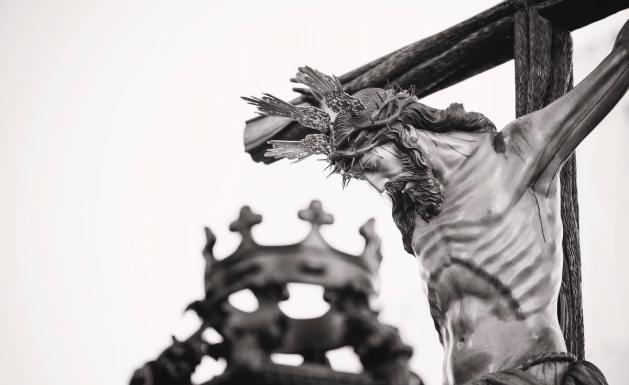
Introduction
In part one of this series, we learned Good Friday is a call for discipleship, and faithfulness, to accept Christ as our savior and follow him wholeheartedly. This sermon is the second part of that series. Today we are going to draw three more life applications from the passion and death of our savior.
1. Don’t be a Carnal Minded Christian
Read Matthew 27:35
A. Like we learned before Romans crucified their victims naked in order to humiliate them as much as possible.
B. It was the custom of the Roman soldiers to divide the clothes of the victims among each other.
C. Jesus’ tunic was seamless, woven from top to bottom as a single piece. The soldiers cast lots to see who will get it. Why cast lots?
D. Fulfillment of the Old Testament Prophecy. Psalm 22:18 says “they divided my garments among them and for my clothing they cast lots” Unlike now in Jesus’ day, clothes and fabrics were rare materials. Therefore were very valuable. The more criminals a Roman soldier crucified the more was his reputation. They kept the victim’s clothes as a trophy.
Implications
The book of Acts chapter 8 verses 18-19 says this. “Now Simon, when he saw that the Spirit was given through the laying on of the apostles’ hands, offered them money, saying, “Give me this power too, so that everyone I place my hands on may receive the Holy Spirit.”
The soldiers represent the carnal-minded Christian. He comes to Christ only to receive the material blessings. Don’t be like him. The Old Testament prophecies indicate God foresaw the fall of mankind and their need for a savior. Thus the birth, death, and resurrection of Christ were not coincident.
2. Confess and Pray for Forgiveness
Read Matthew 27:36-38
Then he said, “Jesus, remember me when you come in your kingdom.”And Jesus said to him, “I tell you the truth, today you will be with me in paradise.” (Luke 23:42-43)
A. Jesus was falsely accused of treason. This is why they put the charge against him above his head which read “This is the king of Jews”.
B. These verses show that Jesus not only lived among sinners but he also died among sinners.
C. Matthew says the outlaws also hurled insults at Jesus. Luke however says one of them repented and Jesus promised him a place in paradise. Why two outlaws?
D. Again this was the fulfillment of the Old Testament prophecy. Isaiah 53:12 foretold Jesus will be numbered with the transgressors. The outlaws were rebels charged with treason against the emperor. It seemed fit for the Roman soldiers to crucify Jesus between them. To demonstrate the unfathomable depths of shame into which Jesus had to descend to earn our salvation.
Implications
The bible says in the book of Proverbs chapter 28 verse 13, “The one who covers his transgressions will not prosper, but whoever confesses them and forsakes them will find mercy.”
From Jesus’ conversation with the repentant outlaw, it becomes evident whoever confesses his sin to God and repents can receive grace and be saved.
3. In life learn to Exercise Self Control
Read Matthew 27:3-40
A. The mocking of Jesus occurred several times, after his trial and before his crucifixion, and after.
B. The narratives of Jesus being mocked are filled with irony, while the mockery focuses on Jesus’ prophetic and kingly roles.
C. He was mocked by four groups of people while on the cross. Religious leaders, people passing by as well as the unrepentant outlaw. Why was he mocked?
D. Once again this was the fulfillment of more Old Testament prophecy recorded in Psalm 22:7-8; 69:20. Mockery was a part of Jesus’ passion because he bore the shame of our guilt. Satan attempted to get Jesus to evade the Father’s will and avoid further suffering by getting people to mock him.
Implications
The Bible says in the book of Proverbs chapter 25 verse 28, “A man without self-control is like a city broken into and left without walls.”
As the one person who had self-control his entire life, Jesus exhibited it on the cross also, because his goal was to rescue us not himself. Likewise, we also need to grow self-control for God’s glory.
Conclusion
This Good Friday message calls us to evaluate ourselves in the light of the three areas mentioned below.
- Did I become a Christian only to enjoy the benefits of being one?
- Do I depend on my own strength more than I depend on God’s grace?
- Do I need more self-control in my life to make progress toward my goals?
You will need to permit the Holy Spirit to change your lifestyle depending on your answer to these questions. In which one of these areas do you must change this Good Friday?
If you found this content helpful, I kindly ask you to leave your feedback in the comments section below. Sharing it with your friends and family through email or social media would also be greatly appreciated. Your feedback not only encourages me but also contributes to the growth and edification of the Church. In order to promote meaningful and respectful dialogue, I request that you use your full name when commenting. Please note that any comments containing profanity, name-calling, or a disrespectful tone will be deleted. Thank you for your understanding and participation.



